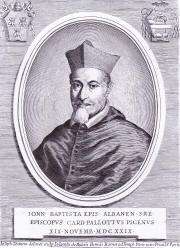Giovanni Battista Maria Pallotta

Giovanni Battista Maria Pallotta (also Palotta or Palotto) (1594–1668) was an Italian Catholic Cardinal.
Early life
Pallotta was born in 1594 in Caldarola to a well respected family. He was the nephew of Cardinal Giovanni Evangelista Pallotta who left him a considerable inheritance[1] which allowed him to be educated and take up an ecclesiastic career in Rome.
Governor of Rome
He was educated in Perugia and then went to Rome during the pontificate of Pope Paul V.[2]
He was appointed Governor of Rome by Pope Urban VIII and was recognised as a particularly pious and strict lawmaker. His contemporary, John Bargrave, detailed the fate of one particular courtesan who flouted Pallotta's edict.[1] Pallotta had decreed that no person should be masked on the Via del Corso during carnivale and ascribed punishments of imprisonment and public flagellation should anyone fail to comply. Local prostitute Checa Buffona was nonetheless paraded along the corso and was subsequently imprisoned. Upon hearing this, Cardinal Antonio Barberini (the Pope's nephew, who Bargrave suggested was a client of Buffona) demanded she be released. Pallotta complied but not before ordering that Buffona be publicly whipped before Barberini could reach the prison to oversee her release.
Portugal
Aware that a conflict between his nephew and his Governor was likely, Pope Urban sent Pallotta to Portugal as papal nuncio and Collector-General. There, in an effort to uphold ecclesiastic jurisdiction over the Portuguese court, he attempted to excommunicate every member of the King's Council.[1]
Pallotta barely escaped; climbing out of a window of his apartment he hurried back to Rome.
Later ecclesiastic career
Upon his return to Rome, Pope Urban was still keen to protect Pallotta from his Cardinal-Nephew, Antonio. He appointed Pallotta titular Archbishop of Thessaloniki in 1628 and then Cardinal in 1629.[3]
He was Camerlengo in 1647 for a year. He became bishop of Albano in 1663 and bishop of Frascati in 1666.[2]
He employed the exiled English poet Richard Crashaw as secretary in 1646 to 1649 but the poet came into conflict with other Pallotta supporters who, unlike the Cardinal himself, offended Crashaw with their vice and licentiousness. Pallotta sent Crashaw away to Loreto but he died not long after, leading to suggestions he had been poisoned.
Pallotta himself died in 1668.
Notes
- 1 2 3 Pope Alexander the Seventh and the College of Cardinals by John Bargrave, edited by James Craigie Robertson (reprint; 2009)
- 1 2 S. Miranda: Giovanni Pallotta
- ↑ Catholic Hierarchy: Cardinal Giovanni Battista Maria Pallotta
|